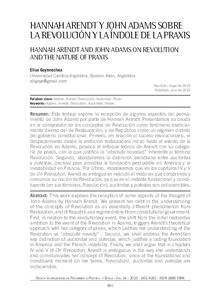Por favor, use este identificador para citar o enlazar este ítem:
https://repositorio.uca.edu.ar/handle/123456789/9933| Título: | Hannah Arendt y John Adams sobre la revolución y la índole de las praxis Hannah Arendt and John Adams on revolution and the nature of praxis |
Autor: | Goyenechea, Elisa | Palabras clave: | Arendt, Hannah, 1906-1975; REVOLUCION; REPUBLICA; PODER; FILOSOFIA POLITICA | Fecha de publicación: | 2020 | Editorial: | Aconcagua Libros | Cita: | Goyenechea, E. Hannah Arendt y John Adams sobre la revolución y la índole de las praxis [en línea]. Revista Internacional de Pensamiento Político. 2020, 14. Disponible en: https://repositorio.uca.edu.ar/handle/123456789/9933 | Resumen: | Resumen: Este trabajo expone la recepción de algunos aspectos del pensamiento
de John Adams por parte de Hannah Arendt. Presentamos su deuda
en la compresión de los conceptos de Revolución como fenómeno esencialmente
diverso del de Restauración, y de República como un régimen distinto
del gobierno constitucional. Primero, en relación al suceso revolucionario, el
desplazamiento desde la ambición restauradora inicial hasta el evento de la
Revolución en Adams, provoca el enfoque teórico de Arendt con su categoría
de praxis, con la que justifica la “absoluta novedad” inherente al término
Revolución. Segundo, abordaremos la distinción arendtiana entre auctoritas
y potestas, decisiva para acreditar la fundación perdurable en América y la
inestabilidad en Francia. Por último, mostraremos que en los capítulos IV y V
de On Revolution, Arendt es ambigua en relación al modo en que comprende y
comunica su noción de Revolución, ya que en el instante fundacional y constituyente
(en sus términos, Revolución), auctoritas y potestas son indiscernibles. Abstract: This work exposes the reception of some aspects of the thought of John Adams by Hannah Arendt. We present her debt in the understanding of the concepts of Revolution as an essentially different phenomenon from Restoration, and of Republic as a regime distinct from constitutional government. First, in relation to the revolutionary event, the shift from the initial restorative ambition to the event of the Revolution in Adams, triggers Arendt’s theoretical approach with her category of praxis, which justifies her understanding of the Revolution as “absolute novelty” . Second, we shall address the Arendtian key distinction of auctoritas and potestas, which justifies a lasting foundation in America and the French instability. Finally, we shall argue that in chapters IV and V of On Revolution, Arendt is ambiguous in the way she understands and communicates her concept of Revolution, since at the foundational and constituent moment (in her terms, Revolution), auctoritas and potestas are indiscernible. |
URI: | https://repositorio.uca.edu.ar/handle/123456789/9933 | ISSN: | 1885-589X (impreso) 1885-589X (online) |
Disciplina: | CIENCIA POLITICA | Derechos: | Acceso abierto | Fuente: | Revista Internacional de Pensamiento Político. 2020, (14) |
| Aparece en las colecciones: | Artículos |
Ficheros en este ítem:
| Fichero | Descripción | Tamaño | Formato | |
|---|---|---|---|---|
| hannah-arendt-john-adams.pdf | 924,55 kB | Adobe PDF |  Visualizar/Abrir |
Visualizaciones de página(s)
750
comprobado en 13-feb-2026
Descarga(s)
621
comprobado en 13-feb-2026
Google ScholarTM
Ver en Google Scholar
Este ítem está sujeto a una Licencia Creative Commons

